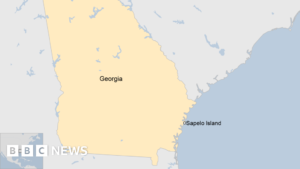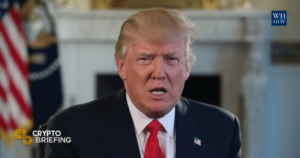Gaza man says Hamas leader Yahya Sinwar was killed in his evacuated house
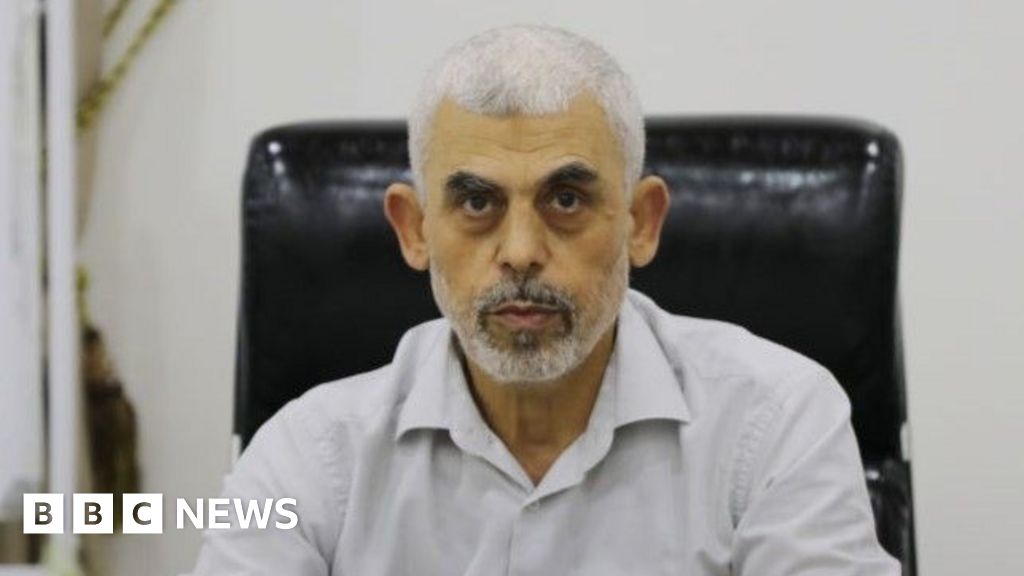
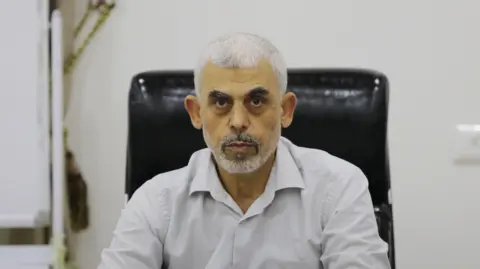 Getty Images
Getty ImagesA displaced Palestinian from Gaza has told the BBC that the house the former Hamas leader was killed in was his home for 15 years before he had to flee in May.
Ashraf Abo Taha said he was “shocked” as he identified the partially destroyed building in Israeli drone footage of the incident as his home on Ibn Sena street in Rafah, southern Gaza.
Yahya Sinwar, the key figure behind the 7 October attacks on Israel, was killed by Israeli troops on Wednesday.
The Israeli military released drone footage that it said showed Sinwar in a partially destroyed house before he was killed.
Mr Abo Taha told BBC Arabic’s Gaza Lifeline that he had left his home in Rafah for Khan Younis on 6 May, when Israel ordered evacuations and began an operation against Hamas fighters, and had not received any news of his house until now.
Mr Abo Taha said his daughter first showed him the footage purportedly capturing Sinwar’s last moments on social media, saying it depicted their house in Rafah. He initially didn’t believe her, he said, until his brother confirmed the house was indeed his.
“I was like ‘yes this is my house’ and I saw the pictures and here I was shocked”, Mr Abo Taha said.
He said he had no idea why Sinwar was there or how he got there.
“Never ever did me and my brothers and sons have anything to do with this,” he said.
The BBC has verified that pictures and videos provided by Mr Abo Taha of his home match imagery of the house where Sinwar was killed.
BBC Verify compared and matched images of the home’s window archways, external decorations on doorways, shelves, and armchairs from the footage.
The BBC cannot independently verify that Mr Abo Taha owned the home.
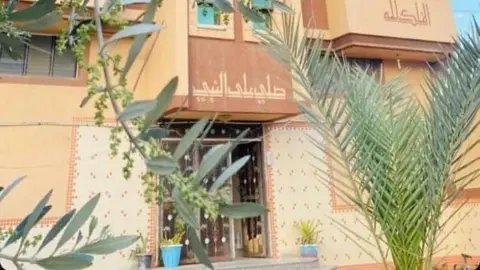 Ashraf Abo Taha
Ashraf Abo Taha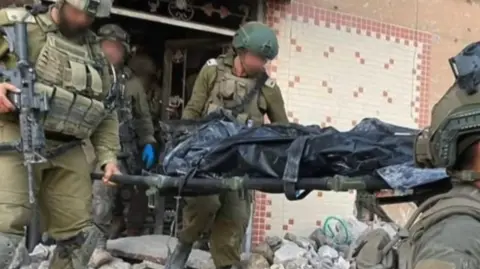 IDF
IDFThe footage of Sinwar’s killing was analysed by the BBC, and the house in which he was last seen was one of the few partially destroyed buildings in a neighbourhood with extensive damage.
The Israeli assault on Rafah in May was met with strong international criticism, and triggered the exodus of more than a million Palestinians, according to the UN.
Many had been forced to move for a second or third time, as they had been sheltering in and around Rafah after being displaced from other parts of Gaza.
Mr Abo Taha said he had built his home in Rafah himself with the help of his siblings. It had cost some 200,000 shekels (£41,400) and had been in good condition when he left, he said.
He described his home’s orange sofas and an orange casserole dish, remembering the last time he saw them as he fled his home.
“These are memories because some of these were brought by my mum and they are very precious to me,” he said.
“What happened has saddened me a lot, the house that I built and all my payments are gone,” he said. “Only God can compensate us.”
#Gaza #man #Hamas #leader #Yahya #Sinwar #killed #evacuated #house
News plays a pivotal role in our lives by keeping us informed and connected to the world. It serves as a critical source of information, offering updates on current events, politics, economics, science, and more. Through news, we gain awareness of global issues and local developments, helping us make informed decisions in our personal and professional lives. News also fosters discussion and debate, encouraging critical thinking and perspective-taking. Moreover, it promotes transparency and accountability among governments, businesses, and other institutions. In a rapidly changing world, staying updated with the news enables us to adapt to new challenges and opportunities, shaping our understanding of the complexities of society. Ultimately, news is not just about information; it empowers us to participate actively in the world around us, contributing to a more informed, engaged, and responsible global citizenry.
Health is fundamental to our well-being and quality of life, making it an essential aspect of daily existence. It encompasses physical, mental, and emotional aspects, influencing our ability to function effectively and enjoy life fully. Prioritizing health allows individuals to maintain optimal physical fitness, reducing the risk of diseases and promoting longevity. Mental health, equally crucial, affects our cognitive abilities, emotional stability, and overall happiness. Investing in preventive healthcare through exercise, balanced nutrition, and regular medical check-ups helps in early detection of potential health issues, ensuring timely intervention and treatment. Beyond individual benefits, a population’s health impacts societal productivity and economic stability. Governments and organizations worldwide emphasize public health initiatives to address pandemics, health disparities, and promote overall well-being. Ultimately, health serves as the foundation upon which we build our lives, influencing our ability to pursue goals, nurture relationships, and contribute meaningfully to society.
Money plays a crucial role in our lives as a means of financial security and freedom. It enables us to meet basic needs such as food, shelter, and healthcare, while also providing opportunities for education, travel, and personal growth. Beyond material comforts, money facilitates social connections and experiences that enrich our lives. It empowers individuals to invest in their futures, whether through savings, investments, or entrepreneurial ventures, thereby fostering economic stability and growth. However, the pursuit of wealth should also be balanced with ethical considerations, as money can influence relationships and societal dynamics. Responsible management of finances is key to achieving long-term goals and mitigating financial stress. Ultimately, while money is a tool for achieving aspirations and fulfilling desires, its true value lies in how it is utilized to improve both personal well-being and the broader community.
Earning Easy Money in 2024: Opportunities and Considerations 💸
In 2024, the landscape of earning easy money presents diverse opportunities, albeit with considerations. The digital age offers platforms for freelancing, online trading, and e-commerce, allowing individuals to leverage skills and creativity for financial gain. Cryptocurrency investments continue to allure with potential for quick profits, yet they entail high volatility and risk. Moreover, the rise of the gig economy enables flexible work arrangements through apps and websites, offering quick payouts but often without job security or benefits. Passive income streams such as rental properties and investments in stocks or bonds remain viable, but demand initial capital and ongoing management. Amid these options, caution is essential to avoid scams and unsustainable ventures promising overnight success. Ultimately, while the allure of easy money persists, informed decisions, diligence, and a long-term perspective are crucial for sustainable financial growth and security in the dynamic year ahead.


